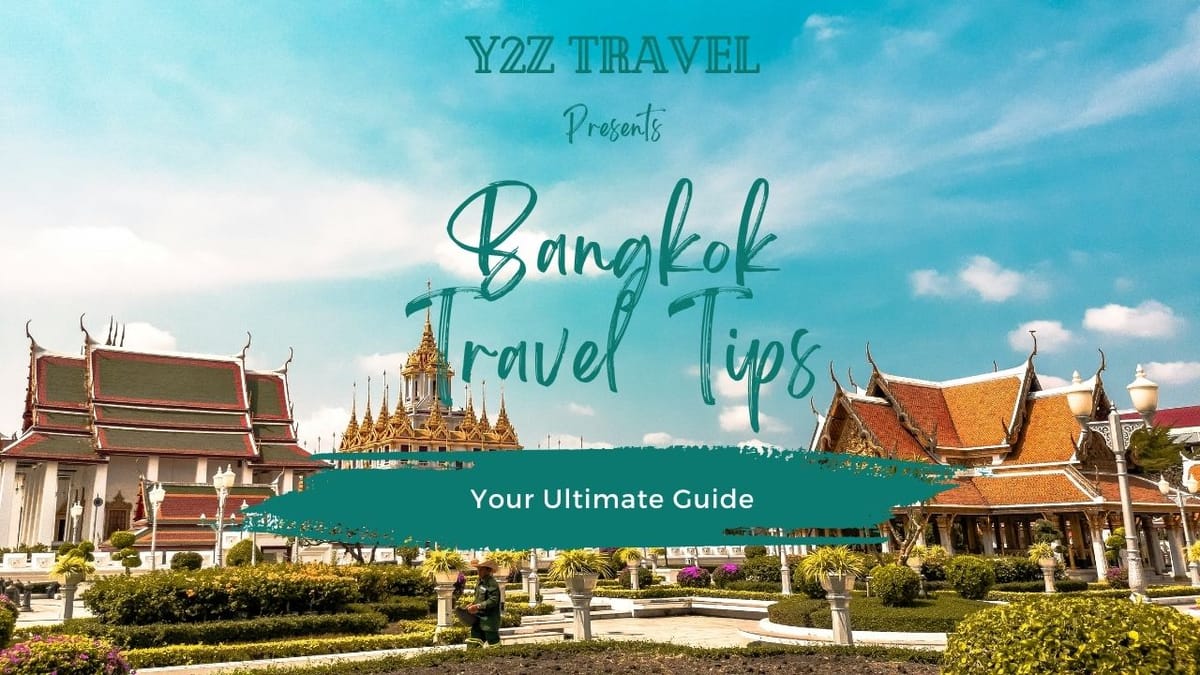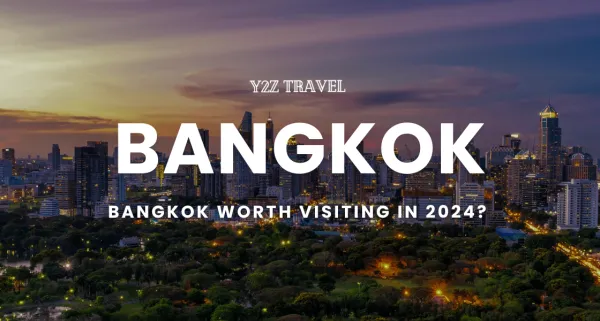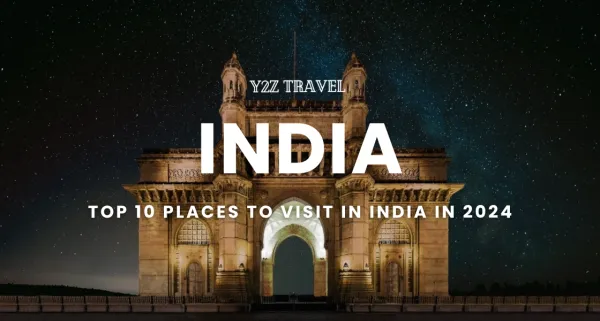Essential Bangkok Travel Tips: Your Ultimate Guide
Navigate the vibrant streets of Bangkok with ease! Our ultimate guide offers top travel tips for an unforgettable adventure in Thailand's bustling capital.

Introduction
Welcome to the bustling cityscape of Bangkok, a melting pot of exotic aromas, tantalizing tastes, and vivid sights. Whether you’re a seasoned traveler or a first-time visitor, this guide is designed to provide practical advice and insider tips to help you navigate through the city’s vibrant streets and hidden alleys. Embark on an unforgettable journey through Thailand’s capital with our Essential Bangkok Travel Tips.
Bangkok Travel Tips
Exploring the mesmerizing city of Bangkok is an adventure in itself. Every corner offers a new discovery, from the grandeur of its temples to the hustle and bustle of its markets. Here are some essential tips to make your trip smooth and enjoyable.
- Transportation:
- BTS Skytrain and MRT Subway: Utilize Bangkok's efficient public transportation system, including the BTS Skytrain and MRT Subway, to navigate the city quickly and conveniently.
- Tuk-Tuks and Taxis: Negotiate fares with tuk-tuk drivers and taxis in advance, and always insist on using the meter to avoid overcharging.
- Dress Code and Etiquette:
- Modest Clothing: When visiting temples and religious sites, dress modestly by covering your shoulders, arms, and knees as a sign of respect.
- Remove Shoes: Remove your shoes before entering someone's home, temples, or certain establishments, as it's a customary practice in Thai culture.
- Street Food:
- Explore Street Food: Indulge in Bangkok's vibrant street food scene, but exercise caution by choosing stalls with high turnover and maintaining good hygiene practices.
- Try Local Delicacies: Sample iconic Thai dishes like Pad Thai, Tom Yum Goong, and Som Tum at authentic street food vendors and local eateries.
- Bargaining:
- Bargain at Markets: Practice your bargaining skills at markets like Chatuchak Weekend Market and Patpong Night Market to secure the best prices for souvenirs and goods.
- Stay Hydrated:
- Drink Bottled Water: Stay hydrated in Bangkok's tropical climate by drinking bottled water, especially when exploring outdoor attractions or walking long distances.
- Be Mindful of Scams:
- Beware of Scams: Stay vigilant and be cautious of common scams targeting tourists, such as gem scams, fake tourist information centers, and overpriced tuk-tuk tours.
- Respect Local Customs:
- Wai Gesture: Return the traditional Thai greeting, the wai, with a slight bow and a palms-together gesture as a sign of respect.
- Respect Sacred Sites: Refrain from inappropriate behavior, loud talking, or disruptive behavior when visiting temples and religious sites.
- Stay Informed:
- Stay Updated: Stay informed about current events, safety advisories, and any travel restrictions in Bangkok by checking official government websites and local news sources.
Crafting the Perfect Bangkok Trip with Y2Z Travel's Personalized Travel Planner
Learn how to use Y2Z Travel’s AI-powered Personalized Travel Planner to create an itinerary that’s tailored just for you and your travel companions.
- Visit Y2Z Travel's Website:
- Start by visiting Y2Z Travel's website and navigate to the Personalized Travel Planner tab, where you'll begin the process of creating your customized Bangkok itinerary.
- Input Your Preferences:
- Input your travel dates, the number of travelers, and any specific preferences or interests you have for your trip to Bangkok.
- Indicate your interests, such as exploring cultural attractions, trying local cuisine, visiting historical landmarks, or experiencing outdoor adventures.
- Select Activities and Attractions:
- Browse through the list of recommended activities and attractions generated by the AI-powered planner based on your preferences.
- Choose from a diverse range of options, including visiting iconic temples like Wat Phra Kaew, exploring vibrant markets such as Chatuchak Weekend Market, and indulging in culinary delights at street food stalls.
- Customize Your Itinerary:
- Use the drag-and-drop feature to arrange the selected activities and attractions into a personalized itinerary that suits your schedule and preferences.
- Adjust the timing and duration of each activity to create a balanced and enjoyable itinerary for your trip, ensuring you have enough time to explore each destination fully.
- Get Recommendations:
- Take advantage of Y2Z Travel's AI recommendations feature, which suggests additional activities, dining options, and accommodation based on your chosen itinerary and travel preferences.
- Explore the recommendations and add any additional items that interest you to your itinerary, enhancing your Bangkok experience with personalized suggestions.
- Review and Finalize:
- Review your finalized itinerary to ensure that it aligns with your preferences and includes all the activities and attractions you want to experience during your trip to Bangkok.
- Make any necessary adjustments or additions before finalizing your itinerary and saving it for easy access during your trip.
- Access Your Itinerary:
- Once your itinerary is finalized, you can access it through Y2Z Travel's website or mobile app, allowing you to easily reference your plans and stay organized during your trip to Bangkok.
Discover the Rich History of Bangkok’s Temples
Bangkok’s temples, or wats, are not just religious sites but also architectural marvels that tell the story of Thailand’s cultural heritage.
1. Wat Phra Kaew (Temple of the Emerald Buddha):
- Discuss the historical and cultural importance of Wat Phra Kaew as the most sacred temple in Thailand.
- Highlight the iconic Emerald Buddha statue and its revered status among Buddhists.
- Explore the intricate architectural details of the temple, including the colorful murals and intricate carvings.
- Share insights into the role of Wat Phra Kaew as a symbol of Thai monarchy and national identity.
2. Wat Arun (Temple of Dawn):
- Provide a historical background of Wat Arun and its significance during the Ayutthaya and Thonburi periods.
- Describe the unique architectural features of the temple, such as the central prang and surrounding towers.
- Discuss the symbolism behind the temple's name and its spiritual significance in Thai mythology.
- Highlight efforts in preserving and restoring Wat Arun to maintain its cultural heritage.
3. Wat Pho (Temple of the Reclining Buddha):
- Introduce Wat Pho as one of the oldest and largest temples in Bangkok.
- Explore the symbolism and cultural significance of the reclining Buddha statue.
- Describe the architectural beauty of Wat Pho, including the ornate pagodas and tranquil courtyards.
- Discuss the temple's role as a center for traditional Thai massage and medicinal education.
4. Wat Saket (Golden Mount Temple):
- Provide a historical overview of Wat Saket's origins as a royal cemetery.
- Describe the iconic golden chedi atop the artificial hill and its panoramic views of Bangkok.
- Highlight the cultural festivals and events held at Wat Saket, such as the annual temple fair.
- Discuss the spiritual significance of Wat Saket as a pilgrimage site for Buddhists.
5. Wat Benchamabophit (Marble Temple):
- Introduce Wat Benchamabophit as one of Bangkok's most beautiful temples.
- Describe the unique architectural features of the marble temple, blending Thai and European styles.
- Discuss the history of its construction during the reign of King Rama V and its royal connections.
- Highlight the importance of Wat Benchamabophit as a center for Buddhist ceremonies and meditation practices.
Savor the Flavors: Street Food and Local Cuisine
Delight your taste buds with the vast array of Thai street food, from spicy papaya salad to succulent grilled meats.
1. Thai Street Food Culture:
- Overview of the lively atmosphere of Thai street food markets, bustling with vendors and hungry patrons.
- Discuss the importance of street food in Thai culture as a social gathering and culinary tradition.
- Highlight the affordability and accessibility of street food, making it popular among locals and tourists alike.
2. Must-Try Thai Street Food Dishes:
- Pad Thai: Describe the iconic Thai stir-fried noodle dish with a perfect balance of sweet, sour, and savory flavors.
- Som Tum (Spicy Papaya Salad): Discuss the refreshing and spicy salad made with shredded green papaya, chili, lime, and peanuts.
- Grilled Meats (Moo Ping, Gai Yang): Explore the succulent grilled pork or chicken skewers seasoned with fragrant Thai spices.
- Tom Yum Goong: Introduce the spicy and aromatic Thai soup made with shrimp, lemongrass, galangal, and chili.
3. Thai Desserts and Sweet Treats:
- Mango Sticky Rice: Describe the classic Thai dessert featuring ripe mangoes served with sweet coconut sticky rice.
- Khanom Krok: Discuss the traditional coconut pancakes, crispy on the outside and soft on the inside, topped with various toppings.
- Roti: Explore the Thai-style roti, a crispy and flaky flatbread served with sweet or savory fillings like condensed milk or curry.
4. Where to Find the Best Street Food in Thailand:
- Recommend popular street food markets and districts in Bangkok, such as Yaowarat (Chinatown) and Khao San Road.
- Highlight other cities and regions in Thailand known for their vibrant street food scenes, such as Chiang Mai and Phuket.
- Provide tips for navigating street food markets, including trying multiple dishes and sampling local specialties.
5. Street Food Etiquette and Tips:
- Offer etiquette tips for enjoying Thai street food, such as using utensils or hands based on the dish.
- Provide guidance on hygiene and food safety practices when dining at street food stalls.
- Encourage travelers to be adventurous and open-minded when trying new flavors and dishes.
Navigating the City: Transportation Hacks
Learn the ins and outs of Bangkok’s transportation system, from the Skytrain (BTS) to the iconic tuk-tuks, to travel like a local.
1. Skytrain (BTS):
- Overview of Bangkok's elevated rapid transit system, known as the BTS or Skytrain.
- Discuss the convenience of the BTS for navigating through the city's busy districts.
- Highlight key BTS stations and their connectivity to popular tourist attractions and shopping centers.
- Provide tips for purchasing BTS tickets, including single journey tickets and day passes.
2. Subway (MRT):
- Introduction to Bangkok's underground metro system, known as the MRT.
- Discuss the coverage and connectivity of the MRT, especially in areas not accessible by the BTS.
- Highlight key MRT stations and their proximity to major landmarks and neighborhoods.
- Provide tips for navigating the MRT system, including purchasing tokens or using stored value cards.
3. Public Buses:
- Overview of Bangkok's extensive public bus network, including both air-conditioned and non-air-conditioned buses.
- Discuss the affordability and accessibility of public buses for exploring different parts of the city.
- Highlight key bus routes and their connectivity to popular tourist destinations and local neighborhoods.
- Provide tips for using public buses, including checking route maps and schedules at bus stops.
4. Tuk-tuks:
- Introduction to the iconic three-wheeled taxis known as tuk-tuks.
- Discuss the unique experience of riding in a tuk-tuk and exploring Bangkok's streets from a different perspective.
- Highlight the flexibility of tuk-tuks for short-distance travel and navigating through narrow alleyways.
- Provide tips for negotiating fares with tuk-tuk drivers and ensuring a safe and enjoyable ride.
5. Water Taxis and Ferries:
- Overview of Bangkok's water transport system, including water taxis and ferries.
- Discuss the convenience of water taxis for traveling along the Chao Phraya River and accessing riverside attractions.
- Highlight key water taxi piers and their connectivity to major landmarks and neighborhoods.
- Provide tips for using water taxis and ferries, including purchasing tickets and understanding different routes.
Shopping Spree: From Markets to Malls
Whether you’re in search of traditional handicrafts or high-end fashion, Bangkok’s shopping scene has it all.
1. Traditional Markets:
- Overview of Bangkok's traditional markets, known for their bustling atmosphere and diverse array of goods.
- Highlight iconic markets such as Chatuchak Weekend Market, known for its size and variety of products.
- Discuss the unique offerings of traditional markets, including local handicrafts, souvenirs, clothing, and street food.
- Provide tips for navigating traditional markets, including bargaining and staying hydrated while shopping.
2. Floating Markets:
- Introduction to Bangkok's floating markets, offering a unique shopping experience along the city's canals.
- Highlight popular floating markets such as Damnoen Saduak and Amphawa, known for their vibrant atmosphere and fresh produce.
- Discuss the variety of goods available at floating markets, including fruits, vegetables, snacks, and handicrafts.
- Provide tips for visiting floating markets, including early arrival to avoid crowds and hiring a boat for a personalized tour.
3. Shopping Malls:
- Overview of Bangkok's modern shopping malls, known for their air-conditioned comfort and extensive range of stores.
- Highlight iconic malls such as Siam Paragon, CentralWorld, and MBK Center, known for their upscale boutiques and international brands.
- Discuss the variety of goods available at shopping malls, including fashion, electronics, cosmetics, and entertainment options.
- Provide tips for navigating shopping malls, including exploring food courts for local and international cuisine and taking advantage of tax refund services for tourists.
4. Boutique Shops and Designer Stores:
- Introduction to Bangkok's boutique shops and designer stores, offering unique and upscale shopping experiences.
- Highlight trendy neighborhoods such as Thonglor and Ekkamai, known for their boutique shops and local designers.
- Discuss the variety of goods available at boutique shops and designer stores, including fashion, accessories, and home decor.
- Provide tips for exploring boutique shops and designer stores, including researching local designers and seeking out hidden gems in lesser-known neighborhoods.
5. Night Markets:
- Overview of Bangkok's night markets, offering a lively shopping experience after dark.
- Highlight popular night markets such as Asiatique The Riverfront and Rot Fai Market, known for their eclectic mix of vendors and entertainment options.
- Discuss the variety of goods available at night markets, including clothing, accessories, handicrafts, and vintage items.
- Provide tips for visiting night markets, including trying street food vendors for dinner and enjoying live music and performances.
Cultural Etiquette: Do’s and Don’ts
Understanding local customs and practices is key to a respectful and enriching travel experience.
1. Do's:
- Respect for the Royal Family:
- Show respect for the Thai monarchy and royal symbols, such as refraining from disrespectful behavior or speech.
- Wai Greeting:
- Learn and practice the traditional Thai greeting known as the wai, which involves placing your palms together in a prayer-like gesture and bowing slightly.
- Remove Shoes:
- Remove your shoes before entering temples, homes, and certain businesses as a sign of respect.
- Modest Clothing:
- Dress modestly when visiting temples or religious sites, covering shoulders and knees out of respect for local customs.
- Respect for Buddhism:
- Show respect for Buddhist customs and traditions, such as refraining from pointing your feet at Buddha images or monks.
2. Don'ts:
- Disrespectful Behavior:
- Avoid disrespectful behavior or speech towards locals, including negative comments about Thai culture or customs.
- Public Displays of Affection:
- Refrain from public displays of affection, such as kissing or hugging, as they may be considered inappropriate in Thai culture.
- Touching Monks:
- Do not touch monks or offer items directly to them, as it is considered disrespectful in Thai Buddhist culture.
- Pointing Feet:
- Avoid pointing your feet at people, Buddha images, or sacred objects, as it is considered rude in Thai culture.
- Disrespecting Religious Sites:
- Refrain from disrespectful behavior or loud conversation in temples or religious sites, as they are places of worship and reflection.
3. Cultural Sensitivity Tips:
- Learn Basic Thai Phrases:
- Learn basic Thai phrases such as "hello," "thank you," and "excuse me" to show respect for the local language and culture.
- Ask Permission Before Taking Photos:
- Always ask permission before taking photos of locals, especially in rural or less touristy areas.
- Be Mindful of Personal Space:
- Respect personal space and avoid standing too close to locals, especially when engaging in conversations.
- Use Right Hand for Gestures:
- Use your right hand for gestures, giving and receiving items, and eating, as the left hand is considered unclean in Thai culture.
Stay Connected: SIM Cards and Wi-Fi Access
Stay in touch with friends and family back home by choosing the right SIM card and finding Wi-Fi hotspots.
1. Choosing the Right SIM Card:
- Overview of the options for purchasing SIM cards in Thailand, including at airports, convenience stores, and mobile phone shops.
- Discuss the major mobile network providers in Thailand, such as AIS, dtac, and TrueMove H, and their coverage areas and plans.
- Highlight the benefits of purchasing a prepaid SIM card, including affordable data packages and the ability to make local calls.
2. Activating and Installing the SIM Card:
- Provide step-by-step instructions for activating and installing the SIM card in your device, including inserting the SIM card and setting up the APN settings.
- Discuss the process of registering the SIM card, which is required by law in Thailand for security purposes.
- Offer troubleshooting tips for common issues when activating or installing a SIM card, such as network compatibility or incorrect settings.
3. Accessing Wi-Fi Hotspots:
- Overview of the availability of Wi-Fi hotspots in Thailand, including in hotels, cafes, restaurants, and public spaces.
- Discuss the benefits of accessing Wi-Fi hotspots, such as saving on data usage and enjoying faster internet speeds.
- Highlight popular locations with free Wi-Fi hotspots in major tourist areas, such as shopping malls and tourist attractions.
4. Using Mobile Data and Roaming:
- Discuss the options for using mobile data while traveling in Thailand, including purchasing data packages with your local SIM card.
- Provide tips for managing mobile data usage to avoid unexpected charges, such as turning off automatic updates and using Wi-Fi whenever possible.
- Discuss the option of using international roaming with your home country's mobile network provider, including the associated costs and considerations.
5. Security and Privacy Considerations:
- Discuss security and privacy considerations when using public Wi-Fi hotspots, such as avoiding sensitive transactions or accessing personal accounts.
- Offer tips for protecting your device and data while traveling, including using secure connections and updating your device's software regularly.
- Highlight the importance of using reputable mobile network providers and avoiding unsecured Wi-Fi networks to protect your personal information.
Money Matters: Currency and Budgeting Tips
Get savvy with your baht to make the most of your travel budget in Bangkok.
1. Understanding the Thai Baht (THB):
- Overview of the Thai Baht (THB) as the official currency of Thailand.
- Discuss the denominations of Thai Baht, including coins (satang) and banknotes (baht).
- Highlight the current exchange rate and the most commonly used banknotes and coins.
2. Currency Exchange:
- Discuss the options for exchanging currency in Bangkok, including at airports, banks, currency exchange counters, and hotels.
- Provide tips for getting the best exchange rates, such as comparing rates from multiple sources and avoiding currency exchange services with high fees.
- Highlight the importance of exchanging currency at reputable and authorized exchange counters to avoid scams or counterfeit currency.
3. Using ATMs:
- Discuss the availability of ATMs in Bangkok and their convenience for accessing cash.
- Provide tips for using ATMs in Thailand, including selecting ATMs with low or no withdrawal fees and informing your bank of your travel plans to avoid card issues.
- Highlight the option of using international bank networks such as Visa or Mastercard for withdrawing cash at ATMs.
4. Budgeting Tips:
- Discuss general budgeting tips for traveling in Bangkok, including setting a daily spending limit and tracking expenses.
- Provide recommendations for budget-friendly accommodations, transportation options, and dining experiences in Bangkok.
- Highlight the importance of researching and booking activities and attractions in advance to take advantage of discounts or promotions.
5. Managing Expenses:
- Discuss strategies for managing expenses while traveling in Bangkok, including using cash for small purchases and keeping larger expenses on a credit card for added security.
- Provide tips for avoiding unnecessary expenses, such as negotiating prices and avoiding tourist traps.
- Highlight the option of using budgeting apps or spreadsheets to track expenses and stay within budget while traveling.
Language Basics: Thai Phrases for Travelers
A few simple Thai phrases can go a long way in enhancing your travel experience and connecting with locals.
1. Greetings and Basic Phrases:
- Hello: "Sawasdee" (สวัสดี)
- Goodbye: "La kon" (ลาก่อน)
- Thank you: "Khob khun" (ขอบคุณ)
- Please: "Khrap" (if you're male) / "Kha" (if you're female) (ครับ / ค่ะ)
- Excuse me: "Khor thot" (ขอโทษ)
- Yes: "Chai" (ใช่)
- No: "Mai chai" (ไม่ใช่)
2. Basic Conversational Phrases:
- How are you?: "Sabai dee mai?" (สบายดีไหม)
- I'm fine, thank you: "Sabai dee, khob khun" (สบายดี ขอบคุณ)
- What is your name?: "Khun chue arai?" (คุณชื่ออะไร)
- My name is...: "Pom chue..." (if you're male) / "Chan chue..." (if you're female) (ผมชื่อ... / ฉันชื่อ...)
- Where is...?: "Tee nai...?" (ที่ไหน)
- How much is this?: "Ani tao rai?" (อันนี้เท่าไหร่)
- I don't understand: "Mai khao jai" (ไม่เข้าใจ)
3. Directions and Transportation Phrases:
- Where is the...?: "Tee nai..." (ที่ไหน)
- Taxi: "Taxi" (ทักษี)
- Bus: "Rot mee" (รถมี)
- Train: "Rot fai" (รถไฟ)
- Airport: "Sanam bin" (สนามบิน)
- Bathroom: "Hong nam" (ห้องน้ำ)
- Hotel: "Rong raem" (โรงแรม)
4. Food and Dining Phrases:
- I would like...: "Ao..." (อยากได้)
- Water: "Nam" (น้ำ)
- Rice: "Khao" (ข้าว)
- Spicy: "Phet" (เผ็ด)
- Not spicy: "Mai phet" (ไม่เผ็ด)
- Delicious: "Aroi" (อร่อย)
- Check, please: "Khep tua" (เก็บเงิน)
5. Miscellaneous Phrases:
- Help!: "Choo-ay!" (ช่วย)
- I'm lost: "Long tua" (หลงทาง)
- Can you help me?: "Choo-ay, dai mai?" (ช่วยได้ไหม)
- I'm sorry: "Khor thot" (ขอโทษ)
- Good luck!: "Chok dee" (โชคดี)
Best Times to Visit: Weather and Festivals
Plan your trip around Bangkok’s weather patterns and vibrant festivals for the best travel experience.
1. Weather Patterns:
- Dry Season (November to February):
- Description of the dry season in Bangkok, characterized by cooler temperatures and lower humidity.
- Highlight the pleasant weather conditions for outdoor activities and sightseeing.
- Recommend this period as the best time to visit Bangkok for comfortable weather.
- Hot Season (March to June):
- Description of the hot season in Bangkok, characterized by high temperatures and humidity.
- Discuss the challenges of visiting Bangkok during the hot season, including the need for hydration and seeking air-conditioned spaces.
- Provide tips for staying cool and comfortable during the hot season, such as wearing light clothing and staying hydrated.
- Monsoon Season (July to October):
- Description of the monsoon season in Bangkok, characterized by heavy rainfall and occasional flooding.
- Discuss the impact of monsoon season on outdoor activities and travel plans.
- Provide tips for navigating Bangkok during the monsoon season, such as carrying an umbrella and planning indoor activities.
2. Vibrant Festivals:
- Songkran (April):
- Description of Songkran, the Thai New Year festival, celebrated with water fights and religious ceremonies.
- Highlight the lively atmosphere of Bangkok during Songkran and the various events and activities held across the city.
- Recommend visiting Bangkok during Songkran for a unique cultural experience and vibrant celebrations.
- Loi Krathong (November):
- Description of Loi Krathong, the festival of lights, celebrated by floating decorated baskets on waterways.
- Discuss the significance of Loi Krathong in Thai culture and its importance as a time of reflection and renewal.
- Recommend visiting Bangkok during Loi Krathong to witness the beautiful lanterns and participate in traditional ceremonies.
Health and Safety: Staying Well in Bangkok
Stay healthy and safe with tips on navigating Bangkok’s healthcare system and avoiding common travel ailments.
1. Healthcare System in Bangkok:
- Overview of the healthcare system in Bangkok, including hospitals, clinics, and medical facilities.
- Discuss the quality of healthcare services in Bangkok and the availability of English-speaking medical professionals.
- Highlight major hospitals and healthcare centers in Bangkok, including international hospitals with specialized services for travelers.
2. Travel Health Precautions:
- Discuss common travel health concerns in Bangkok, including food and water safety, insect-borne diseases, and pollution.
- Provide tips for staying healthy while traveling in Bangkok, such as drinking bottled or boiled water, practicing good hygiene, and using insect repellent.
- Recommend seeking medical advice before traveling to Bangkok, including vaccinations and medications for specific health risks.
3. Emergency Contact Information:
- Provide emergency contact information for healthcare services in Bangkok, including local hospitals and clinics, ambulance services, and emergency hotlines.
- Highlight the importance of knowing how to access medical assistance in case of emergencies while traveling in Bangkok.
- Encourage travelers to carry a copy of their travel insurance policy and emergency contact information with them at all times.
4. Safety Tips for Travelers:
- Discuss safety concerns for travelers in Bangkok, including petty crime, traffic accidents, and scams.
- Provide tips for staying safe while exploring Bangkok, such as staying aware of your surroundings, avoiding poorly lit areas at night, and securing valuables.
- Recommend using reputable transportation services and being cautious when interacting with strangers or unfamiliar situations.
5. Common Travel Ailments and Remedies:
- Discuss common travel ailments in Bangkok, such as traveler's diarrhea, jet lag, and heat exhaustion.
- Provide tips for preventing and managing common travel ailments, such as staying hydrated, eating lightly, and getting enough rest.
- Recommend carrying a basic travel health kit with essential medications and supplies for minor ailments.
Accommodation Choices: Finding the Perfect Stay
From luxurious hotels to cozy guesthouses, find accommodation that fits your style and budget.
1. Luxury Hotels:
- Overview of luxurious hotels in Bangkok, known for their world-class amenities and impeccable service.
- Highlight iconic luxury hotels in Bangkok, such as The Peninsula Bangkok, Mandarin Oriental Bangkok, and The Siam Hotel.
- Discuss the luxurious amenities offered by these hotels, including spa facilities, fine dining restaurants, and panoramic views of the city.
2. Boutique Hotels:
- Introduction to boutique hotels in Bangkok, offering a unique and personalized experience for travelers.
- Highlight trendy boutique hotels in Bangkok, such as Sala Rattanakosin, Ariyasomvilla, and The Eugenia Hotel & Spa.
- Discuss the intimate atmosphere and personalized services offered by boutique hotels, such as stylish accommodations and locally-inspired decor.
3. Budget Hotels and Guesthouses:
- Overview of budget hotels and guesthouses in Bangkok, catering to budget-conscious travelers.
- Highlight affordable accommodation options in Bangkok, such as Lub d Bangkok, Niras Bankoc Cultural Hostel, and Baan Pra Nond Bed & Breakfast.
- Discuss the budget-friendly amenities offered by these hotels and guesthouses, such as dormitory-style rooms, shared facilities, and complimentary breakfast.
4. Serviced Apartments:
- Introduction to serviced apartments in Bangkok, offering a home-away-from-home experience for long-term travelers or families.
- Highlight popular serviced apartments in Bangkok, such as Somerset Sukhumvit Thonglor Bangkok, Citadines Sukhumvit 11 Bangkok, and Adelphi Forty-Nine.
- Discuss the spacious accommodations and fully-equipped kitchens offered by serviced apartments, making them ideal for extended stays or travelers seeking extra comfort and convenience.
5. Alternative Accommodation Options:
- Discuss alternative accommodation options in Bangkok, such as hostels, homestays, and Airbnb rentals.
- Highlight the benefits of alternative accommodation options, including affordability, local experiences, and opportunities for cultural exchange.
- Recommend researching and reading reviews to find reputable and reliable alternative accommodation options in Bangkok.
Day Trips and Excursions: Beyond Bangkok
Expand your horizons with day trips to nearby attractions and hidden gems outside the city.
1. Ayutthaya Historical Park:
- Overview of Ayutthaya Historical Park, a UNESCO World Heritage Site located about 80 kilometers north of Bangkok.
- Highlight the historical significance of Ayutthaya as the former capital of the Kingdom of Siam, featuring ancient ruins, temples, and Buddhist statues.
- Discuss popular attractions within Ayutthaya Historical Park, including Wat Mahathat, Wat Phra Si Sanphet, and Wat Chaiwatthanaram.
2. Damnoen Saduak Floating Market:
- Overview of Damnoen Saduak Floating Market, located approximately 100 kilometers southwest of Bangkok.
- Highlight the vibrant atmosphere of the floating market, where vendors sell fresh produce, snacks, and handicrafts from their boats.
- Discuss activities and experiences at Damnoen Saduak Floating Market, such as taking a boat ride through the canals, sampling local delicacies, and shopping for souvenirs.
3. Kanchanaburi:
- Overview of Kanchanaburi, a province located approximately 130 kilometers west of Bangkok.
- Highlight key attractions in Kanchanaburi, including the Bridge over the River Kwai, Erawan National Park, and Hellfire Pass Memorial Museum.
- Discuss opportunities for outdoor activities in Kanchanaburi, such as hiking, swimming in waterfalls, and exploring historical sites related to World War II.
4. Pattaya:
- Overview of Pattaya, a coastal city located approximately 150 kilometers southeast of Bangkok.
- Highlight popular attractions in Pattaya, including Pattaya Beach, Walking Street, and Sanctuary of Truth.
- Discuss activities and experiences in Pattaya, such as water sports, visiting amusement parks, and exploring cultural attractions.
5. Amphawa Floating Market:
- Overview of Amphawa Floating Market, located approximately 80 kilometers southwest of Bangkok.
- Highlight the authentic and traditional atmosphere of Amphawa Floating Market, known for its seafood offerings and evening boat tours.
- Discuss activities and experiences at Amphawa Floating Market, such as trying local seafood dishes, shopping for souvenirs, and taking a sunset boat ride along the canal.
Nightlife and Entertainment: Bangkok After Dark
Experience the electrifying nightlife of Bangkok, from rooftop bars to night markets.
1. Rooftop Bars:
- Overview of Bangkok's iconic rooftop bars, offering stunning views of the city skyline and a sophisticated atmosphere.
- Highlight popular rooftop bars in Bangkok, such as Vertigo and Moon Bar at Banyan Tree Bangkok, Sky Bar at Lebua State Tower, and Octave Rooftop Lounge & Bar.
- Discuss the variety of cocktails and beverages offered at rooftop bars, as well as the opportunity to enjoy live music or DJ performances.
2. Nightclubs and Music Venues:
- Overview of Bangkok's vibrant nightclub scene, offering a mix of electronic dance music, live bands, and international DJs.
- Highlight popular nightclubs and music venues in Bangkok, such as Levels Club & Lounge, Sing Sing Theater, and Ce La Vi Bangkok.
- Discuss the energetic atmosphere and late-night party scene at Bangkok's nightclubs, as well as the opportunity to dance the night away to the latest beats.
3. Night Markets:
- Overview of Bangkok's bustling night markets, offering a vibrant atmosphere and a wide variety of street food, shopping, and entertainment.
- Highlight popular night markets in Bangkok, such as Asiatique The Riverfront, Rot Fai Market (Train Night Market), and Talad Neon Night Market.
- Discuss the diverse offerings at night markets, including local delicacies, handmade crafts, clothing, and live performances.
4. Muay Thai Boxing Matches:
- Overview of Muay Thai boxing matches in Bangkok, offering an exciting and authentic cultural experience.
- Highlight popular Muay Thai stadiums in Bangkok, such as Lumpinee Boxing Stadium, Rajadamnern Stadium, and Channel 7 Stadium.
- Discuss the adrenaline-filled atmosphere of Muay Thai matches, as well as the opportunity to witness skilled fighters showcase their techniques.
5. River Cruises:
- Overview of river cruises along the Chao Phraya River, offering a unique perspective of Bangkok's illuminated landmarks and skyline.
- Highlight popular river cruise options in Bangkok, such as Chao Phraya Princess Dinner Cruise, Loy Nava Dinner Cruise, and Manohra Luxury Dinner Cruise.
- Discuss the romantic atmosphere and gourmet dining experiences offered on river cruises, as well as the opportunity to enjoy live music and entertainment.
Sustainable Travel: Responsible Tourism in Bangkok
Embrace sustainable travel practices to help preserve the beauty and culture of Bangkok for future generations.
1. Respect Local Culture and Customs:
- Discuss the importance of respecting local culture and customs while traveling in Bangkok, including dress codes, language, and religious practices.
- Encourage travelers to learn about Thai culture and customs before visiting Bangkok and to interact respectfully with locals.
2. Support Local Businesses and Communities:
- Highlight the value of supporting local businesses and communities in Bangkok, including restaurants, markets, and artisans.
- Encourage travelers to seek out locally-owned accommodations, eateries, and souvenir shops to contribute to the local economy.
3. Reduce Plastic Waste:
- Discuss the issue of plastic waste in Bangkok and its impact on the environment, particularly in waterways and marine ecosystems.
- Provide tips for reducing plastic waste while traveling in Bangkok, such as carrying a reusable water bottle, refusing single-use plastics, and opting for eco-friendly alternatives.
4. Use Sustainable Transportation:
- Discuss the importance of using sustainable transportation options in Bangkok to reduce carbon emissions and alleviate traffic congestion.
- Highlight eco-friendly transportation options in Bangkok, including public transit, walking, cycling, and using ride-sharing services with electric vehicles.
5. Choose Eco-Friendly Accommodations:
- Discuss the benefits of choosing eco-friendly accommodations in Bangkok, including energy-efficient practices, waste reduction initiatives, and support for local conservation efforts.
- Highlight eco-friendly hotels and guesthouses in Bangkok that prioritize sustainability and environmental responsibility.
6. Participate in Responsible Tours and Activities:
- Highlight responsible tours and activities in Bangkok that promote sustainability and support local conservation efforts, such as eco-friendly walking tours, community-based tourism experiences, and wildlife conservation projects.
- Encourage travelers to research tour operators and choose activities that prioritize environmental and cultural conservation.
7. Leave No Trace:
- Discuss the importance of leaving no trace while exploring natural areas in and around Bangkok, including parks, beaches, and wilderness areas.
- Encourage travelers to practice responsible waste disposal, respect wildlife and natural habitats, and leave natural areas as they found them.
Creating Memories: Documenting Your Bangkok Trip
Capture and share your Bangkok adventures with photography tips and journaling ideas.
Conclusion
Your trip to Bangkok is bound to be an experience of a lifetime, filled with memories that you’ll cherish forever. From the golden temples to the lively street markets, every moment in this dynamic city has the potential to amaze. With these travel tips in hand, you’re ready to dive into the heart of Bangkok and explore all the wonders it has to offer.
FAQs
Q: What is the best way to get around Bangkok?
A: The BTS Skytrain and MRT subway are efficient options for getting around the city. For shorter distances, tuk-tuks and taxis are convenient, but ensure the taxi meter is running or agree on a fare beforehand.
Q: Can I drink tap water in Bangkok?
A: It is recommended to drink bottled water instead of tap water in Bangkok to avoid health issues.
Q: What should I avoid doing in Bangkok to respect the local culture?
A: Always show respect to the monarchy, dress modestly when visiting temples, and remove your shoes before entering someone’s home or a place of worship.
Q: Is Bangkok safe for solo travelers?
A: Bangkok is generally safe for solo travelers, but it’s important to stay aware of your surroundings and keep your belongings secure.
Q: How can I stay connected with Wi-Fi in Bangkok?
A: Many cafes, restaurants, and shopping malls offer free Wi-Fi access. You can also purchase a local SIM card with a data plan for internet access on the go.
Q: What are some must-try foods in Bangkok?
A: Pad Thai, mango sticky rice, tom yum soup, and green curry are some of the delicious dishes you must try in Bangkok.
Q: How can I create a personalized travel plan for Bangkok?
A: To generate a personalized travel plan for Bangkok, visit Y2Z Travel’s AI Travel Planner for real-time collaboration with friends and family.
Q: Where can I find curated travel experiences for Bangkok?
A: Discover curated travel experiences for Bangkok by expert travelers at Y2Z Travel’s website.
Q: How can I share my trip details with others?
A: You can add and share your Bangkok trip details with others through Y2Z Travel’s ‘Add Your Trip’ feature.
References
- Y2Z Travel. (n.d.). Personalized Travel Planner. https://www.y2z.travel/travel_plans/generate-personalized-travel-plan
- Y2Z Travel Blog. (n.d.). Explore Our Travel Stories. https://www.y2z.travel/blog
- Bangkok BTS Skytrain
- Thai Etiquette
- Bangkok Weather Guide
- Health and Safety Tips for Bangkok
- Bangkok Accommodation Options
- Responsible Tourism in Thailand
- Bangkok Festivals





